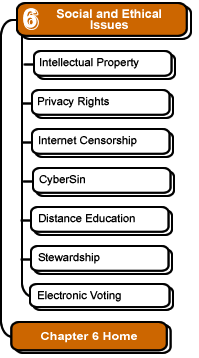

CyberSin: Vices on the Internet
Of course every invention, from television to nuclear power, tends to incarnate the will (conscious or unconscious) of its employer. Stephen L. Talbott, The Future Does Not Compute: Transcending the Machines in Our Midst (Sebastopol, CA: O'Reilly & Associates, Inc., 1995), 33. |
The Internet provides easy, (supposedly) anonymous access to a number of vices, including:
- pornography
- adultery
- gambling
- violence
- plagiarism
- stalking
- racism, hate-mongering
- theft
For the purposes of discussion, consider one of the vices above: adultery. The Internet has led to illicit romantic affairs due to several characteristics of the technology, examined below.
Communication
Filtering
The
Internet allows selective filtering of communication. During a chat session,
only text messages are exchanged, and thus participants in the session
can hide their true identity, physical location,
gender, age, occupation, and almost everything else. Credibility,
honesty, tension, and other important communication qualifiers are typically
available to us during face-to-face communication, but these means are
often not present on the Internet. A speaker's reputation affects his or her credibility
when speaking, but not for anonymous speakers on the Internet. A speaker's
body language also affects credibility, but not when the communication channel
is limited to text.
Because the communication channel is so limited, users have strict control over how much personal information they share. This makes it easier to hide faults and to exaggerate attractive points in one's personality. Thus an illicit love affair over the Internet can start as an innocent electronic conversation, and soon two people can become emotionally involved; however, the emotional bond between them may often be based on innocent or deliberate misrepresentation or hiding of certain personality traits.
False Sense
of Intimacy
Once
one establishes an Internet identity (whether truly representative of
one's personality or not), it is easy to then become emotionally intimate
on the Internet. Intimacy comes from sharing private feelings
and thoughts—easy to do because of the anonymity afforded by
hiding one's identity. Even though they would never disclose such information
to a stranger on the street, and perhaps not even to casual friends, Internet
users often feel no such inhibition electonically. However, such intimacy
can be false, because it is built on a foundation of information hiding
and selective confession.
Individualistic
The
Internet as a communication tool encourages individualism. Because one
has such powerful control over what information is shared and what is
not, the individual—not the community—decides when, where, and
how communication will take place. Communication is often performed alone
in a room at a terminal. Unlike one's physical neighbors, whom we do not
always choose, but must live with nevertheless, virtual "neighbors"
who form a community on the Internet all have joined that community because
of a like interest. In fact, any conversation not related to the community
topic is often considered in bad taste and discouraged. The individual
can select her own communities based on personal interest alone.
![]()
![]()
These pages were written by Steven H. VanderLeest and Jeffrey Nyhoff and edited by Nancy Zylstra
©2005 Calvin University (formerly Calvin College), All Rights Reserved
If you encounter technical errors, contact computing@calvin.edu.